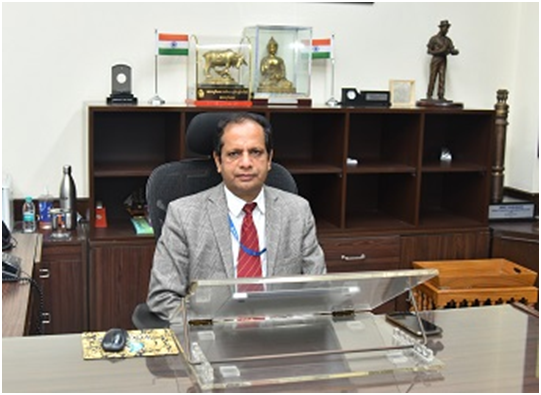Dr Himanshu Pathak is new Secretary-DARE cum DG- ICAR
1st August 2022, New Delhi
The Indian Council of Agricultural Research (ICAR) has
a new chief, Dr Himanshu Pathak as its new Secretary,
Department of Agriculture Research and Education (DARE) cum Director General
(DG), ICAR.
Dr Pathak took over the charge of Secretary, DARE and
DG, ICAR from Dr. Trilochan Mohapatra
Dr. Himanshu Pathak was serving as the
Director, the ICAR-National Institute of Abiotic Stress Management,
Baramati, India. Prior to this he was the Director of the ICAR-NRRI in Cuttack.
He is a scientist of global repute working in the area of Abiotic stress,
Climate change, Soil science.
Former DG of ICAR
Dr. Trilochan Mohapatra took over the charge of
Secretary, Department of Agricultural Research and Education & Director General,
ICAR from Dr S Ayyappan on 22 February, 2016
Dr. Mohapatra was holding the position of
Director-cum-Vice Chancellor of the prestigious Indian Agricultural Research
Institute, New Delhi. Prior to this, he worked as the Director of National Rice
Research Institute (formerly CRRI), Cuttack. He served National Research Centre
on Plant Biotechnology, IARI, New Delhi as researcher and teacher for about 20
years. He is a scientist of global repute working in the area of molecular
genetics and genomics.
Dr. Mohapatra has over 145 research papers in national
and international journals of repute and several book chapters. His research
accomplishments include development of the first high yielding Basmati rice
variety resistant to bacterial leaf blight through molecular marker assisted
selection, and physical mapping and genome sequencing of rice and tomato.
He is a Fellow of the Indian National Science Academy,
National Academy of Sciences-India, Allahabad and the National Academy of
Agricultural Sciences, New Delhi.
First DG of ICAR
Benjamin
Peary Pal or B. P. Pal (26
May 1906 – 14 September 1989)
The history of agricultural development in India is
intimately connected with the achievements of one of the country's foremost
agricultural scientists, Dr B. P. Pal. The Indian Agricultural Research
Institute (IARI) was earlier located in Pusa, Bihar, but after a severe
earthquake damaged its main building, the Institute was shifted to New Delhi in
1936. Dr Pal was the first Indian Director of the IARI in New Delhi at its
campus, which was named Pusa, in 1950 and continued to serve in that capacity
until May 1965, when he became the first Director-General of the Indian Council
of Agricultural Research (ICAR). He held this position from May 1965 to January
1972, during which period the Green Revolution was launched with outstanding
success.
Dr Pal's major contribution to the scientific aspects
of the Green Revolution was in the area of wheat genetics and breeding. He
observed that rust disease was largely responsible for low yields of wheat and,
therefore, developed a systematic breeding method to develop varieties with
resistance to rust disease.
Dr Pal was not only an outstanding scientist, but a
person who distinguished himself through various attributes. His first love
remained the IARI, which he led for 15 years and built up into an institution
of global repute. An indication of his attachment to the Institute is evident
in the fact that he willed to the IARI all his property, including two houses
in New Delhi and Shimla, and his rare collection of roses and other articles.
Dr Pal was a rose breeder of distinction and created
several varieties. He was founder President of the Rose Society and
Bougainvillea Society. He also founded the Indian Society of Genetics and Plant
Breeding and edited the Indian Journal of Genetics and Plant Breeding for 25
years.
Dr Pal was elected President of the Indian National
Science Academy in 1975 and served as the President of the Indian Science
Congress in 1974. He was elected a Fellow of the Royal Society in 1972 and
received numerous awards including the Padma Vibhushan.










No comments:
Post a Comment